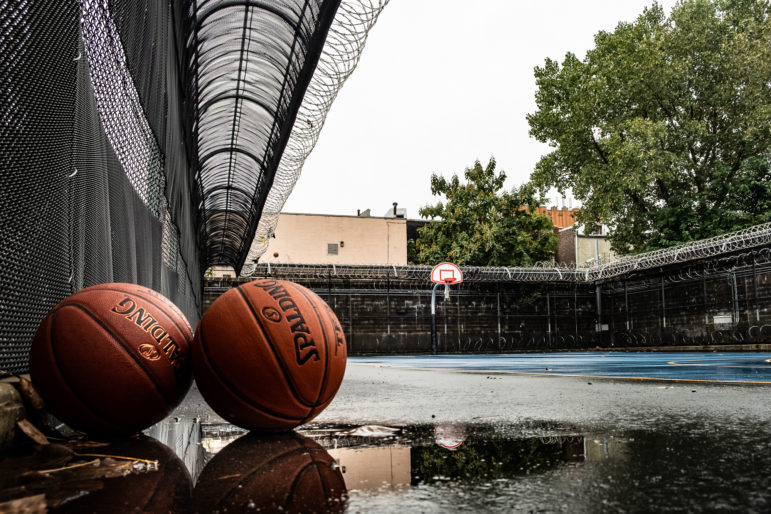“The Youth Justice & Opportunities Act would expand existing protections and limit the lifelong negative consequences that stem from prosecution for actions young people take before they reach full maturity. It would also reduce youth incarceration by increasing access to alternative programs and services, and provide more young people through age 25 the chance to move on without a permanent criminal record.”

Adi Talwar
Basketball courts at a juvenile detention facility in Brooklyn.Learning from mistakes is an integral part of growing into adulthood. Recent advances in science affirm what we know intuitively, that adolescent brains continue to develop and mature until age 25 or 26. But New York’s legal system does not reflect this understanding, instead punishing adolescents and young adults for their mistakes with harsh sentences that can blemish their records for a lifetime. That is why we are proud to sponsor the Youth Justice and Opportunities Act and to stand with young people, community leaders and advocates across our state calling for its passage.
According to a recent report by the Children’s Defense Fund-NY and Youth Represent, tens of thousands of emerging adults ages 18 to 25 are arrested and charged each year. These young people make up only 10 percent of the state’s population but represent a quarter of arrests statewide. There are stark racial disparities both among the emerging adults who enter the system and in the outcomes they face. In 2018, only 16 percent of youth 15 to 24 living in New York were Black, but Black youth accounted for 42 percent of those arrested and 55 percent of those sentenced to prison. These numbers are driven by under-investment worsened by the pandemic: a report by the City’s Disconnected Youth Task Force found that in 2018, one in eight city residents ages 18-24 were both out of school and out of work; in 2020 it was one in four.
One of the most significant effects of a criminal conviction is exposure to the civil consequences which can permanently impair one’s future. These sanctions and restrictions attach to both felony and misdemeanor convictions and affect many areas of young people’s lives, including the ability to access and keep employment, housing, loans, credit, and education. These consequences ensure that punishments meted out last far beyond the term of any court-imposed sanctions. For some prosecuted as teenagers and young adults, they become life sentences of stigma and lost opportunity.
By contrast, limiting the far-reaching consequences of a conviction by passing the Youth Justice & Opportunities Act will allow many young people to meaningfully join the workforce, attend school, live in stable housing, care for their families and contribute to our communities. The Youth Justice & Opportunities Act would expand existing protections under New York law and limit the lifelong negative consequences that stem from prosecution for actions young people take before they reach full maturity. It would also reduce youth incarceration by increasing access to alternative programs and services, and provide more young people through age 25 the chance to move on without a permanent criminal record.
Here in New York City, we are fortunate to have a wide network of alternatives to incarceration and diversion programs that work with young people who have been arrested. These programs provide education, counseling, internships and job training as well as problem-solving and conflict resolution skills. They can incorporate substance abuse treatment, mental health services, arts, sports, and mindfulness activities. Many employ credible messengers—adults with relevant life experiences. These interventions are far less costly and far more humane than incarceration, and they work. We owe it to young people to expand access to them by enacting the Youth Justice & Opportunities Act.
We must expand protections for young people up to age 25. It has been almost two decades since psychologists first coined the term “emerging adulthood” to describe the period from age 18 to 25 during which young people explore adult roles, including those related to work, education, and relationships, as part of their transition to independence. Brain development during this period means that young people have significant capacity to make positive changes, but are also especially vulnerable to trauma. They must be held accountable for harm and other mistakes, but they must receive consequences that are individualized and age-appropriate, not lifelong punishments that cut their futures short.
When New York enacted Raise the Age legislation in 2017, we were in the shameful position of being one of the last two states in the country still automatically prosecuting all 16 and 17 year olds as adults. The Youth Justice & Opportunities Act is a chance for New York to be a national leader by updating our laws to reflect the legal and scientific consensus about adolescent development.
There has never been a more important moment for New York’s young people, families and neighborhoods. The Youth Justice & Opportunities Act, whose campaign is led by young people and their allies, is an opportunity to make real investments in their futures, and the futures of our communities—especially those hardest hit by the pandemic. We look forward to moving this critical legislation in Albany next year as part of our commitment to community safety and young people’s well-being.
Zellnor Myrie is a state senator representing the 20th District in Brooklyn. Daniel O’Donnell is a state assemblymember representing the 69th District in Manhattan.








